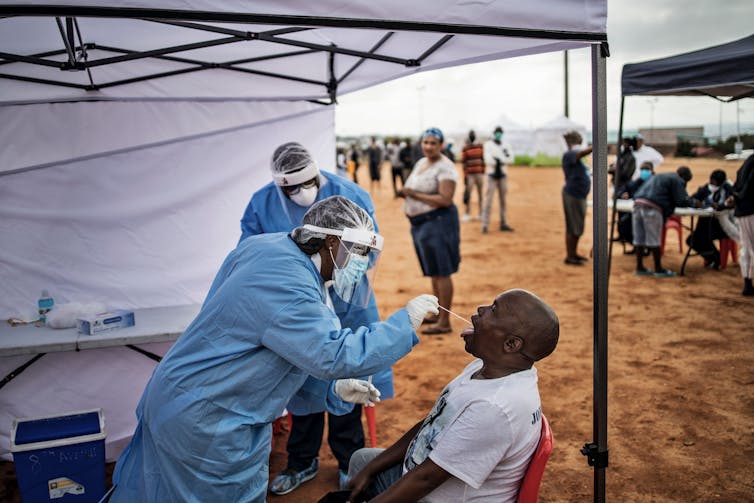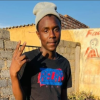- home Home
- keyboard_arrow_right Uncategorized
- keyboard_arrow_right Posts
- keyboard_arrow_rightCoronavirus pandemic holds lessons for South Africa’s universal health care plans
Coronavirus pandemic holds lessons for South Africa’s universal health care plans
By: Steve Reid, University of Cape Town

AFP via Getty Images
The National Health Insurance (NHI) has become an idealistic concept known as “imaginary”. It’s become the idea onto which all South Africa’s aspirations for healthcare have been projected. The dream of a system that is fairer, less divided and more efficient. It’s even been called “pie in the sky”.
It’s clear that some version of the NHI is going to happen regardless of anyone’s opinion. And its success or failure will be determined by the extent to which all South Africans contribute to it.
The NHI is a financing system that will make sure that all South Africans have access to essential healthcare, regardless of their employment status and ability to make a direct monetary contribution to the NHI Fund.
Other middle-income countries such as Brazil and Thailand have shown that it can be done.
This dream of a single national health system could be realised if South Africa is able to articulate a common vision for all its citizens.
But in a complex system such as the health sector, the ideal of universal health coverage as intended by the NHI is unlikely to be attained overnight with the passing of legislation.
The envisaged system can only be implemented through incremental and deliberate bottom-up design. It must incorporate the outcomes of experimentation and reflection with stakeholders at all levels of the system, over time.
The COVID-19 pandemic is shedding light on how best to go about building the NHI – and what to avoid.
On the positive end, it has highlighted the country’s interconnectedness and mutual dependence across sectors. The health minister has shown great leadership and collaborated closely with the scientific community.
On the negative side, the acute crisis has prompted government to work top-down through a centralised command structure. This is not how effective systems based on primary healthcare are built. In the absence of a design approach with clear cycles of learning and feedback of evidence from the ground up, the risk is that the whole NHI system will fail to be implemented. There are many examples of the “implementation gap” between well-intentioned policy and actual practice in South Africa.
So how do people think about healthcare? The most prevalent idea is that of fixing a machine, as if the body just needs a little help when it breaks down occasionally. The metaphor of war
Read more:
War metaphors used for COVID-19 are compelling but also dangerous
may be helpful in responding to the acute crisis of the COVID-19 pandemic. But in the longer term it is not a constructive approach to building an equitable health system for all. The challenge needs to be thought of in different ways.
A more appropriate metaphor
A health system is more than a complicated organisation, it is an extremely complex one. The human body itself is an appropriate image of a complex, adaptive system. It’s a biological marvel in which each part simultaneously affects every other part. A further level of complexity arises when these changing systems are challenged by trauma or illness, and have to adapt to new environments or stressors.
It is remarkable how the body inexorably tends towards preserving or re-developing a functional norm after a catastrophic disturbance such as a stroke or major trauma.
COVID-19 is just such a trauma – an assault to all of our systems, out of the blue. Like the process of adapting to the challenges of a chronic disability, the South African health system must moreover cope with the inherent deficits in society resulting from the legacy of colonialism and apartheid, which created the enormous inequities that have been laid bare by the pandemic.
The fundamental divide between the for-profit value system of the private health sector on the one hand, and the human rights-based approach of the public sector on the other, needs to be bridged rather than deepened, building on the intersectoral innovations that the pandemic has elicited.
Read more:
COVID-19 shows that where there is political will there is a way to work across sectors
South Africa could learn a lot from the process of physical rehabilitation, and how a person can adapt to complex disruptions, with the pragmatic help of a team of skilled health professionals, through relationships and hope. Whatever the nature and extent of the precipitating historical event, the unrelenting task is to restore order out of chaos, and to work in solidarity with the patient to optimise their function over time. ‘Resilience’ is defined as the positive adaptation to significant adversity, that builds capacity for future challenges, in contrast to negative adaptations that ultimately make things worse.
The country’s health system will need such ongoing rehab post-COVID-19 to overcome divisions and build a national health system from the bottom up. The ideal of universal health coverage as intended by the NHI will require a deliberate process of experimentation, reflection and incremental adaptation over a number of years. Fundamental principles of primary healthcare, such as equity, health promotion and community participation, will be critical.
This COVID-19 pandemic highlights the fact that South Africa already has the technical expertise and capacity, in governance, in health economics, in health systems, in information systems, as well as in community participation in health.
Read more:
Investing in research is South Africa’s best insurance policy against crises
Inspiring initiatives in purpose-driven social entrepreneurship are motivated not by private profit but by public benefit. And there are population-based capitation models for primary care in other middle-income countries that are already working well.
COVID-19 has brought many of these initiatives to the fore, to bridge the divide between those who have and those who don’t. Solidarity and commitment to the common good are the pivotal values that are needed at this time and into the future.
There is hard and persistent work that needs to be planned for, like a kind of ongoing rehabilitation process, to realise the dream of one health system for all South Africans.![]()
Steve Reid, Medical academic and Chair of Primary Health Care, University of Cape Town
This article is republished from The Conversation under a Creative Commons license. Read the original article.
Written by: Natasha
Similar posts
MORE ARTICLES

Two boys accused of killing Grade 10 pupil remain behind bars

45 individuals arrested in Pretoria for drunk driving over the weekend

Pics: Inside Liesl Laurie-Mthombeni’s girls’ vacation

Berita celebrates 34th birthday with new single ‘Gugulethu’

Gauteng settles major e-toll debt with R5.4 billion payment
QUICK LINKS
UpComing Shows

959 Music Weekdays
Kaya 959 Hits
Real. Familiar. Memorable. Kaya 959 brings you the music you know and love from our playlist. Uninterrupted. Thursdays 20h00 to 21h00
close
The Best T in the City
With T Bose
He has held it down in the world of mid-morning radio with the best music, riveting topics, brilliant mixes and interesting guests. Every weekday, The Best T proves why he is the BEST by connecting to you like only your bro or favourite uncle could. He lets his listeners dictate the songs they want to hear in the ever-popular Top 10 at 10, and his Three Teaspoons never run out. Catch The Best T in the City Mondays to Fridays from 09h00 to 12h00.
close
Feel Good
With Andy Maqondwana
Feel good about feeling good! That's exactly what The Feel-Good show is about. An escape from the negativity that surrounds us, indulging you in good feels. Pass it on to one and all. Spread the good feeling around Gauteng with Andy Maqondwana.
close
Kaya Biz
With Gugulethu Mfuphi
The world of business is simplified for you by Kaya Biz with Gugulethu Mfuphi. This fast-paced award-winning business show talks to the corporate giants as well as up and coming entrepreneurs about their wins and challenges. Gugulethu invites guests to offer their analyses of markets and economies, and also delves into issues of personal financial wellness. Kaya Biz airs Mondays to Thursdays 18h00 to 19h00.
close
Point of View
With Phemelo Motene
Point of View with Phemelo Motene delves into the day’s current affairs, touches on real issues that affect people’s daily lives and shares expert advice on questions posed by the audience. Mondays to Thursdays 20:00 to 22:00.
closeConnect with Kaya 959
DownLoad Our Mobile App
© 2025 Kaya 959 | On The Street On The Air










